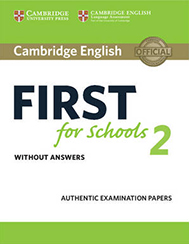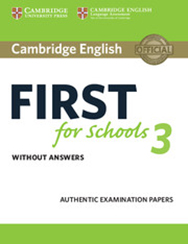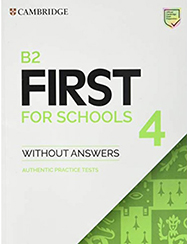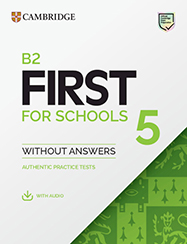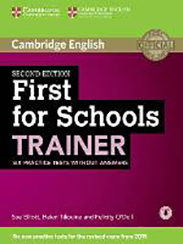B2 First (FCE) for Schools is a Cambridge Assessment English Qualification targeted at upper-intermediate level of the CEFR (B2 level). It is made up of four parts and designed to prove that students can successfully use English language in the real world. B2 First (FCE) for Schools is officially recognized by universities, employers, and governments around the world.
B2 First (FCE) for Schools is an in-depth exam designed by Cambridge Assessment English— an exam board of Cambridge Assessment department of the University of Cambridge, with more than 60 years of experience and expertise in developing and delivering exams to over 5.5 million learners in more than 130 countries.
In 2012, Cambridge Assessment English authorized the Hellenic American Union as one of the official exam centres for B2 First (FCE) for Schools examination in Greece.
Candidates can choose to take B2 First (FCE) for Schools as either paper-based or a digital exam. Similar to the paper-based version, the digital exams are offered at certified test centers across Greece. Although the format of the exams is different, digital exams test the same knowledge and skills as our paper-based exams. In B2 First (FCE) for Schools Digital, candidates use digital tools that allow them to manage the digital environment and perform to the best of their abilities. Both B2 First (FCE) for Schools and B2 First (FCE) for Schools Digital have been developed based on decades of world-leading expertise in language testing for learners.
B2 First (FCE) for Schools is an internationally recognized exam opening doors to several universities, employers and governments around the world as proof of upper-intermediate level on the Common European Framework of Reference (CEFR). B2 First (FCE) for Schools – regardless of whether candidates are examined through the paper-based or digital format – is recognized by the private sector, as well as the Greek state (ASEP/Supreme Council for Civil Personnel Selection), as follows:
|
Level of recognition |
Overall score |
|---|---|
|
C1 |
180-190 |
|
B2 |
160-179 |
|
B1 |
140-159 |
B2 First (FCE) for Schools certificates are valid for life and do not expire. Some institutions, however, such as universities, colleges and employers accept certificates taken recently, usually within 2 to 3 years, to check if candidate’ language skills have been used and maintained. Certificate holders should always check the requirements of the organization of their choice.
Paper 1: Reading And Use of English
Duration: 1 hour 15 minutes
Number of parts: 7 parts
Candidates write their answers in the answer sheet using pencil.
Number of questions: 52 questions in total
Marks: 40% of total
Part 1 (8 questions - 1 mark for each correct answer)
A text in which there are eight missing words or phrases (gaps). Four possible answers for each gap are provided and candidates have to choose the answer that best fits each gap (A, B, C or D).
Part 2 (8 questions - 1 mark for each correct answer)
A text in which there are eight gaps. Candidates have to think of only one word that best fits each gap.
Part 3 (8 questions - 1 mark for each correct answer)
A text in which there are eight gaps. At the end of each line, there is a given word/stem word that needs to be formed correctly to better complete the sentence.
Part 4 (6 questions - up to 2 marks for each correct answer)
Six sentences are given followed by a key word. Candidates have to use the keyword to complete the second sentence so that it has a similar meaning to the first one. For each gap two to five words can be used.
Part 5 (6 questions - up to 2 marks for each correct answer)
A text followed by six multiple-choice questions. Each question has four options (A, B, C or D), and candidates have to decide which is the correct answer.
Part 6 (6 questions - up to 2 marks for each correct answer)
A text with six empty spaces (gaps). After the text, there are some sentences in jumbled order that have been removed from the text. Candidates have to choose the correct sentence for each gap.
Part 7 (10 questions - 1 mark for each correct answer)
Multiple matching questions followed by a single text or several shorter texts. Candidates have to match a given prompt to certain elements of the text(s).
Paper 2: Writing
Duration: 1 hour 20 minutes
Number of parts: 2 parts
Candidates write their answers in the answer booklet using pen.
Marks: 20% of total
Part 1
Candidates are presented with a short prompt and have to write a related essay of 140–190 words using ideas from this prompt. The essay is on a subject of general interest and candidates are expected to express their opinion and support it with reasons.
Part 2
Candidates are asked to write one of the four following questions for part 2: article, email/letter, essay, review or story of 140–190 words. From January 2024, optional set text questions are removed.
Paper 3: Listening
Duration: about 40 minutes, including 5 minutes’ transfer time
Number of parts: 4 parts
Candidates write their answers in the answer sheet using pencil.
Number of questions: 30 questions
Marks: 20% of total (1 mark for each correct answer)
Part 1 (8 questions - 1 mark for each correct answer.)
A series of short, unrelated extracts of approximately 30 seconds each. Candidates have to listen to the extracts and answer one multiple-choice question for each. Each question has three options (A, B or C).
Part 2 (10 questions - 1 mark for each correct answer.)
A monologue lasting approximately 3 to 4 minutes. Candidates have to complete the sentences on the question paper with information they hear on the recording.
Part 3 (5 questions - 1 mark for each correct answer)
Candidates listen to five short related monologues of approximately 30 seconds each. They have to choose which statement from a list of eight best matches what each speaker says.
Part 4 (7 questions - 1 mark for each correct answer)
Candidates listen to an interview or an exchange between two speakers and answer seven multiple-choice questions. Each question has three options (A, B or C). The extract lasts approximately 3 to 4 minutes.
Paper 4: Speaking
Duration: 14 minutes per pair of candidates
Format: 2 examiners -2-3 candidates)
Number of parts: 4 parts
Marks: 20% of total
Part 1
A brief conversation with the examiner who asks candidates about themselves, their past, present and future life plans.
Part 2
Both candidates are given a set of two photographs to talk about.
An individual long turn for each candidate followed by a brief response from the second candidate.
Part 3
A two-way conversation between the candidates who are given instructions with written prompts to be used in a discussion. The discussion involves a decision-making task.
Part 4
A discussion on a few topics related to the above collaborative task.
Paper 1: Reading And Use of English
Duration: 1 hour 15 minutes
Number of parts: 7 parts
Test takers use their keyboard and mouse to select, compose and submit their answers. In the Reading test, test takers can make notes, highlight text and review their answers.
Number of questions: 52 questions in total
Marks: 40% of total
Part 1 (8 questions - 1 mark for each correct answer)
A text in which there are eight missing words or phrases (gaps). Four possible answers for each gap are provided and candidates have to choose the answer that best fits each gap (A, B, C or D).
Part 2 (8 questions - 1 mark for each correct answer)
A text in which there are eight gaps. Candidates have to think of only one word that best fits each gap.
Part 3 (8 questions - 1 mark for each correct answer)
A text in which there are eight gaps. At the end of each line, there is a given word/stem word that needs to be formed correctly to better complete the sentence.
Part 4 (6 questions - up to 2 marks for each correct answer)
Six sentences are given followed by a key word. Candidates have to use the keyword to complete the second sentence so that it has a similar meaning to the first one. For each gap two to five words can be used.
Part 5 (6 questions - up to 2 marks for each correct answer)
A text followed by six multiple-choice questions. Each question has four options (A, B, C or D), and candidates have to decide which is the correct answer.
Part 6 (6 questions - up to 2 marks for each correct answer)
A text with six empty spaces (gaps). After the text, there are some sentences in jumbled order that have been removed from the text. Candidates have to choose the correct sentence for each gap.
Part 7 (10 questions - 1 mark for each correct answer)
Multiple matching questions followed by a single text or several shorter texts. Candidates have to match a given prompt to certain elements of the text(s).
Paper 2: Writing
Duration: 1 hour 20 minutes
Number of parts: 2 parts
Test takers use their keyboard and mouse to select, compose and submit their answers. The Writing test has an automatic word count and they can easily edit their work.
Marks: 20% of total
Part 1
Candidates are presented with a short prompt and have to write a related essay of 140–190 words using ideas from this prompt. The essay is on a subject of general interest and candidates are expected to express their opinion and support it with reasons.
Part 2
Candidates are asked to write one of the four following questions for part 2: article, email/letter, essay, review or story of 140–190 words. From January 2024, optional set text questions are removed.
Paper 3: Listening
Duration: about 40 minutes, including 5 minutes’ transfer time
Number of parts: 4 parts
For the Listening test, headphones with volume control help test takers listen comfortably and concentrate to perform the best of their abilities. Test takers use their mouse to select and submit their answers.
Number of questions: 30 questions
Marks: 20% of total (1 mark for each correct answer)
Part 1 (8 questions - 1 mark for each correct answer.)
A series of short, unrelated extracts of approximately 30 seconds each. Candidates have to listen to the extracts and answer one multiple-choice question for each. Each question has three options (A, B or C).
Part 2 (10 questions - 1 mark for each correct answer.)
A monologue lasting approximately 3 to 4 minutes. Candidates have to complete the sentences on the question paper with information they hear on the recording.
Part 3 (5 questions - 1 mark for each correct answer)
Candidates listen to five short related monologues of approximately 30 seconds each. They have to choose which statement from a list of eight best matches what each speaker says.
Part 4 (7 questions - 1 mark for each correct answer)
Candidates listen to an interview or an exchange between two speakers and answer seven multiple-choice questions. Each question has three options (A, B or C). The extract lasts approximately 3 to 4 minutes.
Paper 4: Speaking
Duration: 14 minutes per pair of candidates
Format: 2 examiners -2-3 candidates)
Number of parts: 4 parts
The Speaking test is face-to-face, to help test takers develop real world communication skills.
Marks: 20% of total
Part 1
A brief conversation with the examiner who asks candidates about themselves, their past, present and future life plans.
Part 2
Both candidates are given a set of two photographs to talk about.
An individual long turn for each candidate followed by a brief response from the second candidate.
Part 3
A two-way conversation between the candidates who are given instructions with written prompts to be used in a discussion. The discussion involves a decision-making task.
Part 4
A discussion on a few topics related to the above collaborative task.
B2 First for Schools results are reported on the Cambridge English Scale. Although the parts are 4, candidates will receive 5 scores on their Statement of Results (Reading, Use of English, Writing, Listening and Speaking) which give them a clear understanding of their performance. These five scores are averaged to give them an overall result for the exam. They will also be given a grade and Common European Framework of Reference for Languages (CEFR) level.
For B2 First for Schools, the following scores will be used to report results:
|
Cambridge English Scale Score |
Grade |
CEFR level |
|
180–190 |
Grade A |
C1 |
|
173–179 |
Grade B |
B2 |
|
160–172 |
Grade C |
B2 |
|
140–159 |
Level B1 |
B1 |
Scores between 122 and 139 are also reported for B2 First for Schools. Candidates will not receive a certificate, but their Cambridge English Scale score will be shown on their Statement of Results. Scores below 122 are not reported, so candidates will not receiver a certificate nor a score for this examination.
The following factsheet can be used as a guide to help teachers and candidates understand how Cambridge English scale works. This information is better applied when using official Cambridge English practice tests.
Register online for your exams through ORFEAS, our online registration system. Find an examination center close to home from a choice of 100 locations throughout Greece and abroad, and complete your application online with your debit, pre-paid or credit card.
You will receive all the details for your upcoming exam via email in a single document that you can save, print and take with you on the day of your test. You will also be sent updates on the status of your application and useful support materials. Expect invitations to webinars for tips and strategies that will help you prepare effectively for the exam.
The ORFEAS registration system does away with print application forms and visits to the bank. Start and complete your registration online in a few simple steps. Use your home computer, tablet or smartphone to apply for your exam.
Cambridge University Press & Assessment provides the opportunity to secure nonstandard test accommodations for candidates with disabilities and/or learning difficulties. For detailed information regarding the types of special accommodations offered, the required medical documentation, as well as the request submission process, please visit the Cambridge University Press & Assessment’s Nonstandard Test Accommodations page.
March 2025
| Exam Period | Exam Date | Result announcement date |
|---|---|---|
| March 2025 | 08/03/2025 | 17/04/2025 |
April 2025
| Exam Period | Exam Date | Result announcement date |
|---|---|---|
| April 2025 | 05/04/2025 | 20/05/2025 |
May 2025
| Exam Period | Exam Date | Result announcement date |
|---|---|---|
| May 2025 | 10/05/2025 | 20/06/2025 |
| 18/05/2025 | 27/06/2025 | |
| 31/05/2025 | 10/07/2025 |
June 2025
| Exam Period | Exam Date | Result announcement date |
|---|---|---|
| June 2025 | 07/06/2025 | 17/07/2025 |
| 14/06/2025 | 24/07/2025 | |
| 21/06/2025 | 31/07/2025 | |
| 28/06/2025 | 07/08/2025 |
Immediate online access to results via Orfeas
The results of the Cambridge University Press & Assessment exams are announced through the Orfeas online platform. Using their personal login credentials, Language Schools and individual candidates can access the platform, view their results, and download their detailed score reports.
Please note that the published result release dates are indicative and may be subject to change by Cambridge University Press & Assessment. Additionally, results may not be released in bulk on the specified dates, as Cambridge reserves the right to release them gradually.
Results announcement by Cambridge University Press & Assessment
The exam results will be announced on the official Cambridge website as follows:
- For Language Schools:
Results will be available through the official Preparation Centre Results page. In case of access issues, please contact the Hellenic American Union in a timely manner at +302103680000, prior to the official release date. - For all candidates:
Results will be available via the official Results Service for Candidates page. To log in, registration is required using the candidate's email address, ID Number, and Secret Number, all of which are listed on the individual exam timetable.
If candidates do not have access to their individual exam timetable and are registered through a Language School, they should contact the respective school to have it sent to them.
Independent candidates can re-download their timetable from the Orfeas platform or retrieve it from the email sent by the Center for Examinations and Certifications before the exam.
Note: This service is intended exclusively for candidates, as it allows them to send their detailed results to educational institutions, employers, and organisations of their choice. More information about this process is available on the Results Verification Service webpage.
March 2025
| Exam Period | Exam Date | Result announcement date |
|---|---|---|
| March 2025 | 08/03/2025 | 21/03/2025 |
April 2025
| Exam Period | Exam Date | Result announcement date |
|---|---|---|
| April 2025 | 12/04/2025 | 28/04/2025 |
May 2025
| Exam Period | Exam Date | Result announcement date |
|---|---|---|
| May 2025 | 03/05/2025 | 16/05/2025 |
| 10/05/2025 | 23/05/2025 | |
| 21/05/2025 | 04/06/2025 |
June 2025
| Exam Period | Exam Date | Result announcement date |
|---|---|---|
| June 2025 | 04/06/2025 | 18/06/2025 |
| 21/06/2025 | 04/07/2025 | |
| 22/06/2025 | 04/07/2025 | |
| 02/07/2025 | 16/07/2025 |
Immediate online access to results via Orfeas
The results of the Cambridge University Press & Assessment exams are announced through the Orfeas online platform. Using their personal login credentials, Language Schools and individual candidates can access the platform, view their results, and download their detailed score reports.
Please note that the published result release dates are indicative and may be subject to change by Cambridge University Press & Assessment. Additionally, results may not be released in bulk on the specified dates, as Cambridge reserves the right to release them gradually.
Results announcement by Cambridge University Press & Assessment
The exam results will be announced on the official Cambridge website as follows:
- For Language Schools:
Results will be available through the official Preparation Centre Results page. In case of access issues, please contact the Hellenic American Union in a timely manner at +302103680000, prior to the official release date. - For all candidates:
Results will be available via the official Results Service for Candidates page. To log in, registration is required using the candidate's email address, ID Number, and Secret Number, all of which are listed on the individual exam timetable.
If candidates do not have access to their individual exam timetable and are registered through a Language School, they should contact the respective school to have it sent to them.
Independent candidates can re-download their timetable from the Orfeas platform or retrieve it from the email sent by the Center for Examinations and Certifications before the exam.
Note: This service is intended exclusively for candidates, as it allows them to send their detailed results to educational institutions, employers, and organisations of their choice. More information about this process is available on the Results Verification Service webpage.
There are two stages in the rescoring process by Cambridge English:
Stage 1: Full clerical re-check
- Application deadline: Within 20 calendar days from the date your results are announced
- Result notification: Within 5 to 10 working days from the date of your rescoring application
Stage 2: Re-mark of all written papers
- Application deadline: Within 40 calendar days from the date your results are announced
- Result notification: Within 15 to 20 working days from the date of your rescoring application
Find information on the terms and conditions for having one or more sections of your test rescored.
Discover our available results and certificates services. Learn how you can request, among other things, the rescoring of your test, the notarization of a copy of a certificate, and the issuance of a certification of loss of a certificate.
How do I sign up for Orfeas?
If you are an individual candidate:
- Visit the Hellenic American Union website.
- Navigate to “Sign In”.
- Then select “Register” and fill in your personal information.
- You will receive an automated e-mail with a link to verify your account and complete the registration.
- Click on the link and fill in your username and password. Finally, select “Sign In” to complete the registration process.
If you are a teacher or a Foreign Language School owner:
- Visit the Hellenic American Union website and complete the form with your personal and/or business information, and upload the required documents.*
Please note: You will be asked to provide an email address to register for Orfeas. This address, as well as the optional secondary email address should not have been used previously to create an Orfeas account or register as an individual candidate.
- Select “Save”.
- You will receive an automated e-mail with a link to verify your account and complete the registration.
- We will process your request, and e-mail you with a temporary password for first-time access. After that, you will be asked to change your password.
*Acceptable documents (max 5 MB):
For teachers (one of the following):
- Proficiency in English certificate
- Degree from a foreign university with English as the language of instruction
- English Language and/or Literature degree
- Renewal of teaching license
- Certificate of commencement of teaching profession
- CELTA (Certificate in Teaching English to Speakers of Other Languages)
- DELTA (Diploma in Teaching English to Speakers of Other Languages)
- English Literature document of final year studies
For Foreign Language Schools (one of the following):
- Business registry details from the Independent Authority for Public Revenue (ΑΑΔΕ)
- Certificate of commencement of activity for individual entrepreneurs
- Certificate from the General Commercial Registry (ΓΕΜΗ)
- Company stamp
- Certification from the Organization for Certification of Qualifications & Professional Orientation (ΕΟΠΠΕΠ)
Please note that this step is required to register yourself or your students for your chosen exams at a later time.
How can I order your books?
You can place your order in the following ways:
- Completing an order form through the online store of our educational publications.
- Sending an e-mail to publications@hau.gr or calling +2103680000, option 2. Be sure to include your full name, address, Hellenic American Union collaboration number, and email address (if you have called to place your order).
Please note: Orders over €20.00 are sent free of charge; otherwise, a delivery fee of €5.00 applies.
How can I register for the certificate exams of my choice?
For Foreign Language Schools owners and teachers:
- After logging into Orfeas with your e-mail and password, select the “Applications/Registrations” section. You will be automatically redirected to the “My Students” tab.
- If this is your first time registering a student, select “New Student”, fill in their personal details (using all Roman capital letters, exactly as they appear on their ID or passport), and click “Save”. If the student has already been registered, you can find them in your student list.
- Select the checkbox next to the candidate’s name (or select multiple boxes if you wish to register multiple candidates for the same exam). Then, click “Register Students”.
- When the pop-up window appears, follow the on-screen instructions. Click “Submit”, and you will be automatically directed to the “My Exams” tab.
- You will see the new group of students for registration. Click “Pay & Submit” to choose your payment method and to finalize your application.
For Individual Candidates:
- After logging into Orfeas with your e-mail and password, go to the “Registration” section.
- Enter your personal details using Roman capital letters, exactly as they appear on your ID or passport.
- Read and accept the terms and conditions, then click “Save”.
- You will be automatically redirected to “My Exams”. Select “New Application” from the top right.
- Follow the on-screen instructions, and click on “Submit” to review your application, and click “Pay & Submit” to complete the process.
How do I pay the examination fee?
To pay the examination fee, you must first complete the registration and application for your chosen exam.
Available payment options:
- Credit Card
- IRIS
- Reference Code
To make a payment using the Reference Code, please follow these steps:
- Use e-banking or phone banking through your bank.
- Select “HELLENIC AMERICAN UNION” in the “Payments” field.
- Select the fee amount specified in the confirmation email you received after registration. You may also optionally enter the candidate’s full name in the “Payment Description/Details” field. Please kindly note that the payment may be processed within up to 3 working days from the date of deposit.
Can I delete my application or my student’s application?
According to exam regulation 4.12., the examination fees paid are non-transferable and non-refundable. If you notice any mistakes in your application and need to correct them, please contact us via email at exams@hau.gr or by phone at +30 2103680000.
Do you offer non-standard test accommodations?
You can request special accommodations when you register the candidate on Orfeas.
You will need to provide the medical documentation that describes the candidate’s disability or/and learning difficulty; this must be issued by a qualified medical professional.
Documentation must be original, in Greek or English, or certified copies. Documentation in a language other than Greek must be translated into Greek or English by an authorized professional or authority, such as a lawyer or the Hellenic Ministry of Foreign Affairs Translation Service. Either the original certified translation or a certified copy of the original certified translation can be submitted.
For more information on the types of accommodations, required documentation, and the application process, please visit our Nonstandard Test Accommodations page.
How can I stay updated on the status of my application?
For Foreign Language Schools and teachers:
Once you have completed the application process for your students, you will receive a confirmation email regarding their payment and exam registration. Approximately ten days before the exam date, you will receive another email with information about the release of your students’ exam schedules on Orfeas.
For individual candidates:
Once you have completed the application process, you will receive a confirmation email regarding your payment and exam registration. Approximately ten days before the exam date, you will receive another email with information about the release of your schedule on Orfeas.
How do I access my exam schedule or that of my students’?
For Foreign Language Schools and teachers:
Your students’ exam schedule will be available approximately ten days before their examination date. To access your candidates' schedules, follow these steps:
- Log in here to the Orfeas system.
- Select 'Applications/Registrations'.
- Select 'My Exams'.
- Select the exam group (e.g., ECPE May 2023).
- Click on “Files” in the pop-up window and “Schedules” to download your students' schedules.
For individual candidates:
Your exam schedule will be available approximately ten days before your examination date. To view your schedule, follow these steps:
- Sign in to Orfeas.
- Click on “Registration”.
- Select “My Applications”.
- Choose the application of your choice (e.g., ECPE May 2023).
- Click on “Exam Schedule” in the pop-up window and select “Download Schedule” to download your schedule.
What should I bring with me on the day of the exams?
On the day of the exam, you must:
- Bring a valid national identity card, passport, driver’s license or an identity certificate (“tautoprosopia” with a stamped photo) from the official authority. If you do not have one of these documents, you will not be allowed to enter the examination room.
- Bring an analog watch (except for Cambridge English exams), a soft pencil (#2) or a pen (for the Writing section if taking a Cambridge exam at B1 level or above) and an eraser.
- Arrive at the test center at least thirty (30) minutes before your scheduled exam time.
On the day of the exam, you must not:
- Bring your mobile phone or any other electronic devices (smartwatches, portable media players, etc.).
- Bring books, notes, or other educational materials.
For more details, visit Exam Guidelines.
What should I do if I miss my scheduled Speaking test?
If you miss your scheduled Speaking test, please contact the Hellenic American Union Center for Examinations and Certifications as soon as possible:
- Athens: +30 210 368 0000 (9:00-19:00), exams@hau.gr
- Thessaloniki: +30 2310 557 600 (9:00-17:00), thessaloniki@hau.gr
How do I access my students’ or my results?
For Foreign Language School owners and teachers:
To access your students’ results, follow these steps:
- Sign in to Orfeas.
- Click on “Applications/Registrations”.
- Select “My Exams”.
- Select the exam group (e.g., ECPE May 2023).
- Click on “Download Score report” to download your detailed score report.
For individual candidates:
To access your results, follow these steps:
- Sign in to Orfeas.
- Click on “Registration”.
- Select “My Exams”.
- Select your application (e.g., ECPE May 2023).
- Click on “Scores” in the pop-up window, and select “Download Score report” to download your detailed score report.
Note: If you wish to view your results but you did not register as an individual candidate, but rather through your teacher or Foreign Language School, you must register as a new user in the Orfeas system after 2:00 PM on the following day of the announcement of the results. Then, select “Exam Results” from the menu and, by filling in the required fields, you will have access to your results.
How do I apply for rescoring?
The exams administered by the Hellenic American Union are scored by the test developers under strict quality control conditions. These measures ensure the accuracy and validity of the results.
However, you can arrange to have your exam rescored, if you wish, for a fee and within the timeframe set by the test developer. To do so, fill out the rescoring request form (which becomes available the day of the results announcement) which we will send to the examination body. You will receive the result of the rescoring by email.
For more information, visit the Rescoring page.
How do I receive my certificate?
- If you registered for the exam through a Language School or teacher, your certificate will be sent directly to them.
- If you were an individual candidate at a test center outside Athens, your certificate will be mailed to the address you provided during registration. No further action is required on your part.
If your address has changed since your registration, please complete and submit the relevant form to Certificates Application Form to certificates@hau.gr. - If you were an individual candidate at a test center in Athens:
- You can pick up your certificate in person by visiting our offices, from Monday to Friday, 9 am to 5 pm, from the Results and Certifications Office (Massalias 22, 10680, Athens) and presenting your identity card, passport, driving license or an identity certificate (“tautoprosopia” with a stamped photo) from the official authority.
- Υou can receive your certificate via courier service free of charge by following the steps below:
- Download, complete, and sign the application form.
- Forward the completed application together with a copy of your identity card, passport or any other legal identification document (e.g., a driver’s license or identity certificate - “tautoprosopia” - containing a photograph stamped by a Public Authority), using one of the following ways:
- By mail: Didotou 15, 10680 Athens, or Fragkon 14, 54626, Thessaloniki
- By email: certificates@hau.gr
We will notify you by email once your certificate is ready for shipment.
For more information on the receipt and shipping of original certificates, please visit our Results and Certificates Services page.
I have lost my certificate. Can I have it reissued?
Lost certificates cannot be reissued if more than twenty-four (24) months have passed since the exam date. However, the Hellenic American Union can provide you with a document certifying the loss of your certificate. A fee to cover administrative costs is charged for this service.
If you need to have your certificate reissued or a certification of loss issued, or if you need more information on lost or damaged certificates, please visit our Results and Certificates Services page.
Is my certificate recognized by the Supreme Council for Civil Personnel Selection (ΑΣΕΠ)?
The B1 to C2 level English language proficiency certificates issued by the Hellenic American Union are officially recognized in Greece by both the state (Supreme Council for Civil Personnel Selection - ΑΣΕΠ) and the private sector. To learn more about the alignment between our language proficiency certificates and ASEP (ΑΣΕΠ) levels, please see here.
Is my certificate recognized by foreign universities?
Language proficiency certificates can be used for academic and professional purposes abroad. However, each university has its own requirements regarding the accepted certificates. Therefore, we recommend contacting the foreign universities you are interested in directly to inquire about the English language certificates they accept, as well as any potential time limitations regarding their validity.
Schedule
| Exam Date: | Exam Administration: | Test Centers: | Registration Period: |
|---|---|---|---|
|
|
|
Registration Period:
|
Support
Find useful information for your exams or existing certifications, tips and advice, free preparation material and more.

